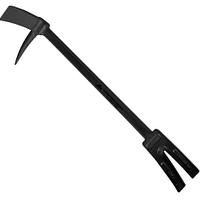Share your craft projects
Make new craft buddies
Ask craft questions
Blog your craft journey
I’m pretty new to woodworking, so this is a great topic I think. I’ve only been doing it about 10-12 years, so it’s all still fresh. I’d say try to find a mentor. Find a guild, go to some classes, something. I made so many mistakes setting up my shop because I didn’t know or understand how a shop was supposed to flow, or how projects moved through phases. I just wanted to ‘do it’, ya know? I’m kind of a tool collector, and I don’t mind that. Buying tools you’ll use is fine…of course buy once, cry once applies. Which is another reason to find a mentor…someone to help you understand quality vs gimmicky before you’ve figured it out on your own. Lastly, don’t skimp on shop infrastructure. Good lighting, climate controls (if needed), electrical capacity and layout, and DUST COLLECTION cannot be overstated. Setting the shop up in such a way to make what you’re doing safer, cleaner and more comfortable will ALWAYS pay dividends in my book. Some of my biggest mistakes were in this area, and it’s taken years and a lot of work to rectify that! If I’d found a mentor or a guild, so much of that would have been avoided simply by seeing how things ‘could be’ before I built my own shop…
Next I’d say don’t limit yourself. I started doing mostly construction projects, before I moved into furniture, then into more artsy stuff, then back into furniture-ish things, etc… I never felt like ‘well, I’m making furniture now, so that’s what I do, make furniture…”. Especially as a hobbiest, making shop furniture and fixtures and jigs is one of the things I like most. But then I got some interest in turning and eased into that. And you know what? One compliments the other. Having a lathe means I can turn parts for other projects, no matter what the project type is. That list goes on…
I also take notes, especially on finishing. Pretty detailed notes too. What I sanded to, what finish materials were used, how much, how many coats, at what interval. Finishing is an art and a science, and it really makes or breaks almost any type project you do. I’ve got pages and pages of notes about finishes in general, their strong points and weaknesses, that I’ve gathered over the years. Standing on the shoulders of others helps me choose the right product and finish style for the project I’m working on…you can cover yourself in sanding dust three times over making things perfect, but a botched finish, or just the wrong finish, can make it all for not. For me, there is no ‘one’ finish…although it would be easier if there were! Matching proper finish materials to project style and wood species can make a good project GR8! as Tony would say…
Next I’d say don’t limit yourself. I started doing mostly construction projects, before I moved into furniture, then into more artsy stuff, then back into furniture-ish things, etc… I never felt like ‘well, I’m making furniture now, so that’s what I do, make furniture…”. Especially as a hobbiest, making shop furniture and fixtures and jigs is one of the things I like most. But then I got some interest in turning and eased into that. And you know what? One compliments the other. Having a lathe means I can turn parts for other projects, no matter what the project type is. That list goes on…
I also take notes, especially on finishing. Pretty detailed notes too. What I sanded to, what finish materials were used, how much, how many coats, at what interval. Finishing is an art and a science, and it really makes or breaks almost any type project you do. I’ve got pages and pages of notes about finishes in general, their strong points and weaknesses, that I’ve gathered over the years. Standing on the shoulders of others helps me choose the right product and finish style for the project I’m working on…you can cover yourself in sanding dust three times over making things perfect, but a botched finish, or just the wrong finish, can make it all for not. For me, there is no ‘one’ finish…although it would be easier if there were! Matching proper finish materials to project style and wood species can make a good project GR8! as Tony would say…
Ryan/// ~sigh~ I blew up another bowl. Moke told me "I made the inside bigger than the outside".









